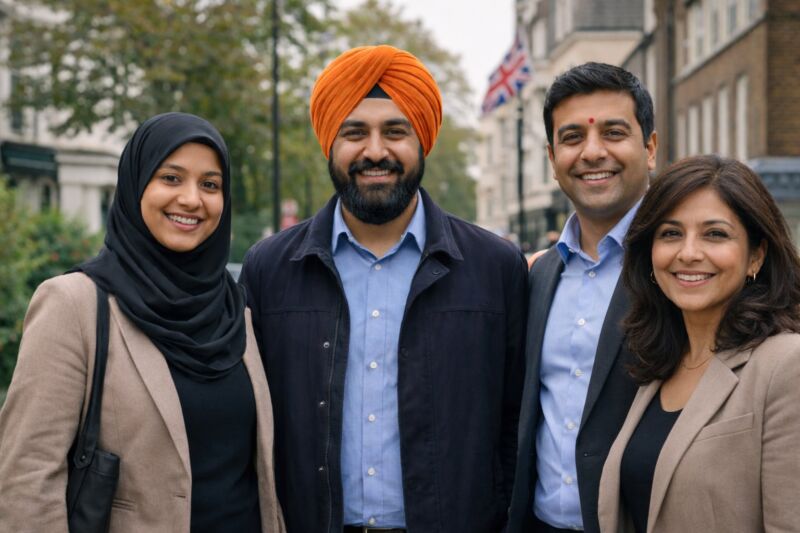Nobody told me when I was eight that there was any question of whether I could be English. England had struggled to qualify for the World Cup, as a football-obsessed primary school kid I was as obsessed as everyone else by whether Kevin Keegan, the one footballer every eight-year-old had heard of, would be fit to captain the team. It seems a good thing that nobody ever said: “What has this got to do with you, Sunder? You can’t support England.” I cannot see how it would have helped if they had.
So I am English and British – and had always identified as English as well as British from a young age. I was ten when I read about a group of racist skinheads chanting the wrong score “we only won one-nil” after John Barnes scored one of the best England goals any of us will ever see as England beat mighty Brazil two-nil. My mum read the Daily Mail newspaper: their sports report forty years ago mentioned it just to say that this racism was shocking. Watching the Olympic Games from LA in 1984, it was the British team which competed for medals. As Daley Thompson and Tessa Sanderson celebrated their gold medals with the Union Jack, it was clear that black and white people could be equally proudly British too. We probably have experiences of events involving national identity before we hear any theories about it – and I am glad that mine were positive (despite Kevin Keegan missing a great chance to score and keep England in that World Cup against Spain).
By the time I was a teenager I understood that racially exclusive arguments about both who was British and who was English were not simply confined to football hooligans and racist thugs. Sometimes they had more respectable advocates in parliamentary politics too. Yet the basic fact of the potential and reality of a racially inclusive English identity seemed a settled fact when Paul Ince was the first Black captain of the England team in 1993. Nobody suggested he was not English – and the culture inside the stadium took a massive step forward with Euro 96, and much later again with the Lionesses.
So I do find it surprising that this settled common-sense consensus, not just for sports fans but for most of the broad public for three decades, can still generate controversy among politicians and commentators in 2025. Former Home Secretary Suella Braverman has written about how she does not consider herself English, and how others like her – meaning those from an ethnic minority background whose parents were not born here – cannot be English either. This was sparked by Konstantin Kisin, host of the triggernometry podcast, suggesting that former Prime Minister Rishi Sunak could not be English. His assertion that both Sunak’s race and faith should be barriers to others accepting Sunak’s English identity – “He is brown and Hindu, how can he be English?” – has been endorsed by Suella Braverman too.
So what’s going on with their confusion about how English identity works today?
It is curious that Braverman and Kisin – neither of whom identify as English themselves – have decided to declare new rules for who can be English. It’s stranger still that these made-up rules are so at odds with the views of the broad majority of those who consider themselves as English today.
We should respect that both Kisin and Braverman identify as British, not English. But we should seek a little reciprocal respect too for those whose English identity they simply dismiss as unlikely, fake or meaningless. The core flaw is that neither Kisin nor Braverman demonstrate even a minimal level of curiosity in understanding the English consensus on how people become English.
Konstantin Kisin was born in Russia, before coming here as a schoolboy, and is proud to have naturalised as a British citizen – but does not believe Englishness is open to him too. In this, he follows what most migrants who have come to England over the centuries have always done. His personal experience underlines something true: that English is not quite so civic as British identity. Having spotted that, Kisin mistakenly jumps to the binary assumption that it must be a blood-based ethnic identity instead.
The truth is rather more interesting. English identity today is the product of a little recognised and paradoxical-sounding phenomenon, that of “inclusive nativism”. Kisin does not believe that his children, born in England, can identify as English, because of “blood”. But they may well come to do so, because of birthplace. While migrants invariably identify as British, rather than English, across most of the last ten centuries the children and grandchildren of migrants have often felt a birth-right claim to Englishness too, quite often surprising their Jewish and Irish parents, or increasingly their black, Asian and perhaps in time Russian parents too.
So the common sense consensus is that people become English if they are both born in England and identify as English – and so are accepted as English by most English people, on that basis.
Sunder Katwala discusses English identity with Ian Collins on Talk TV, 28 Feb 2025:
In calling for a consensus on who can be English, Braverman has not noticed how strongly a common-sense consensus has grown on this over the last three decades. Nine out of ten people in England agree that those born in England who identify as English should be accepted as English. The number who rejected this has halved between 2012 and 2019, largely because older people noticed the new social norm and adopted it too. (A toxic racist fringe would reject the claim of Braverman and Kisin to be British: 3% of people believed it important to be white to be truly British when Ipsos-Mori asked that in 2020).
This inclusive nativism – that being born and bred in England does count, regardless of skin colour or faith, if you identify as English – is entirely missed by Suella Braverman, who writes dismissively about “a plane ticket and a birth certificate” as if they are the same thing. “How many generations must pass before one can claim to be English? Five? Six? It is a question without an easy answer”, she writes in in her Telegraph commentary piece. The only charitable thing to do with this thought would be to assume that no thought has gone into it whatsoever.
Thoughtlessness could prove an important defence for Braverman. It seems deeply unlikely that she would defend the outcomes that her piece logically entails – when applying it to the specific cases of those who identify as English, without five or six generations of English ancestry. But she would surely lose the Conservative whip were she willing to do that – since it would involve rejecting the English identity – on racial grounds – of many people accepted as English by just about everybody who is not a vocal and overt racist.
Braveman has over a hundred Conservative parliamentary colleagues who do identify as English. If she sense-checked her theory with them, she would find it unlikely that any would declare that Marcus Rashford and Jude Bellingham are too black to be English – nor that Moeen Ali’s declaration of his pride in being English should be rejected on the grounds of his visibly Muslim beard and Pakistani heritage. It may seem even more baffling that the ‘Braverman rules’ would reject Harry Kane and Wayne Rooney as too Irish to be English too.
Sporting symbolism has undoubtedly entrenched this common-sense consensus that English national identity has been multi-ethnic since the 1990s. That is one of the reasons why Asian English identity is less intuitively familiar than that of the black English, with little presence in football in particular. But this is not just a question of sport. Braverman – born in Harrow, growing up in Wembley – chooses not to identify as English. That was common in the 1970s and 1980s – but most Asian and black people born in England identify as belonging to England – and most have come to call themselves English as well as British too.
Braverman’s argument does not just report her choice not to identify as English. She argues that ethnic minorities “should not” do so – at least before they have five or six generations of ancestry here. This would seem to entail that almost nobody black or Asian, Hindu, Muslim or Jewish who identifies as English would qualify – under Braverman rules – for another couple of generations at least.
Needing English ancestry to identify as English would have left us with an English group containing almost none of those who became English after 948 AD. Today’s clearly multi-ethnic English identity is arguably not so much a rupture as a continuation with how English identity has worked for ten centuries, when those born in England identify as English and are accepted as doing so.
Yet this 90% consensus on how English identity is still underestimated by the opinion formers in the liberal-left and right-of-centre media – for overlapping and different reasons. The graduate classes, on both the left and the right, are more likely to identify as more British than English, so tend to caricature those who identify as more English than British. UK-wide institutions in England tend not to think about an English dimension, as well as about Scotland and Wales, so the social norm reflected in sport is too seldom recognised outside of it. Progressives tend to be excessively pessimistic about the scale of the inter-generational shift against exclusive racist attitudes – while online racists, increasingly amplified on Elon Musk’s X platform, mistake their echo chambers for public opinion.
The loud effort of the online right to make English racially exclusive again has little chance of succeeding. It tells us more about the eco-system of a vocal minority than it does about any change in the increasingly entrenched English consensus on how people become us.













